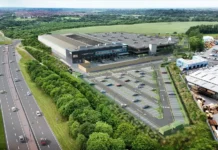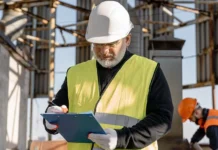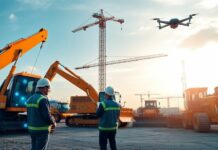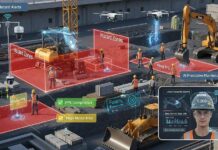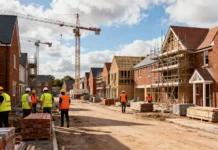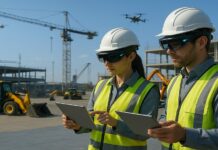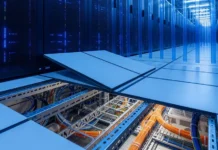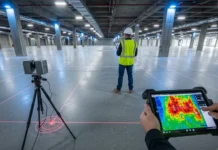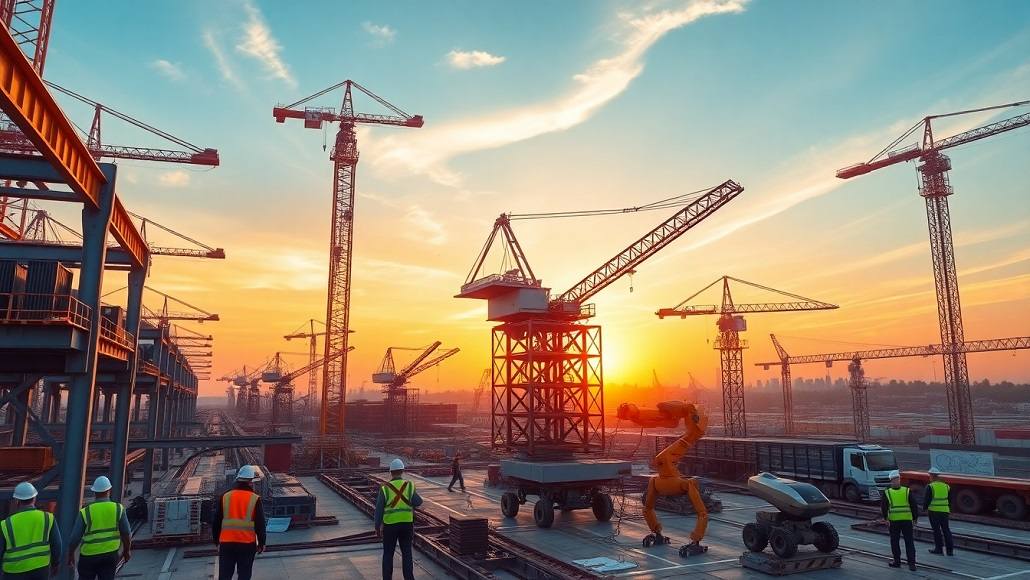In spite of the global economic headwinds, the construction as well as engineering sector is marching forward with immense confidence. Triggered by the growing demand for housing, infrastructure, and also municipal projects, the sector is all set for a prominent expansion. As a matter of fact, forecasts go on to suggest that the global construction output can as well rise to $22 trillion by 2040 from the 2023 mark of $13 trillion, which is indeed a testament to the enormous potential that this market holds. However, with this kind of growth comes a new set of challenges. Handing over projects on time, within the budget, and with minimal rework is not enough. Companies have to make sure that they adopt and meet steep ESG standards and also optimize their performance while functioning on a very razor-thin margin, sometimes as low as 1 to 2%.
Embracing industrial AI in construction
In order to meet these demands, forward-thinking construction as well as engineering firms are turning their way to industrial artificial intelligence. It is indeed more than a buzzword. Industrial AI happens to be quickly becoming the cornerstone of this industry’s digital evolution. Right from autonomous machinery along with smart design tools to wearable safety technology, as well as predictive maintenance, artificial intelligence is indeed revolutionizing how projects are thought about, built, and even maintained. There are industry studies that suggest that almost 79% of firms anticipate artificial intelligence to deliver measurable benefits within the next one to three years, and that too for a good reason. AI is indeed helping companies to evaluate their intricate project data, and that too in real time. It is also helping in forecasting risks, expenditures, and even schedules with greater precision. AI has automated time-consuming processes and tracks assets as well as workforce performance. The decisions due to AI have become much faster and also data-driven. However, perhaps the most important potential happens to lie in how AI can actually transform the asset life-cycle processes and core projects, standardize the execution part and also elevate productivity throughout the board.
Setting up the groundwork – The Digital Foundation
In spite of embracing industrial AI in construction, there are many firms that are still in the early stages of digital adoption. They are infested with outdated systems, disjointed tools, and manual processes such as spreadsheets, which are pretty common and hence limit the abilityto harness dependable data. For AI to work in an effective way, a strong digital foundation is a must, and that starts with integrated platforms that can unify operations, decision-making, and even data. By not having centralized or standardized data, AI tools cannot function at their full potential. The transition from siloed systems to enterprise-wide Digital solutions are indeed very crucial in order to unleash the real value of artificial intelligence.
How AI has already started to change the game?
Artificial intelligence is already making a measurable effect throughout key functions within construction and engineering.
Financial control of the project
AI supports precise budgeting, forecasting, and estimation, thereby decreasing dependence on error-prone methods, which are mostly manual. Automated financial control processes enhance the accessibility of costs and also the overall project’s profitability.
Detection of anomaly
Because of high-quality data, AI agents can actually pinpoint any sort of irregularities, and that too in real time, thereby automatically triggering certain alerts or even corrective measures in order to prevent issues before they even crop up.
Automation of documents
Intelligent character recognition helps with automatic scanning as well as processing of necessary documents like goods received notes, bid submissions, etc., thereby improving their speed as well as precision.
Risk along with opportunity management
AI tools happen to identify as well as assess risk in the early stages of the product life cycle, thereby offering timely insights, which help the teams to act in a very proactive as well as quick way.
Contract along with change management
AI-powered analysis when it comes to contract modification offers real-time evaluation of how changes can actually affect the project timelines and even margins, thereby helping to lessen any sort of disruptions.
Efficiency of operations
It is well to be noted that repetitive administrative tasks all across procurement, finance, human resources, supply chain, and even safety can get automated, therefore freeing the teams to stress more on work that is of high value.
Going beyond the projects
There are many construction companies that also manage equipment rentals, do facilities management, and even do manufacturing. AI can help elevate processes throughout these domains by delivering value that is far beyond the traditional design and even build functions for that matter.
So what lies ahead—a future that is data-driven?
Marching forward, over 50% of construction as well as engineering firms plan to inculcate AI into their operations by 2025. However, success will not come from just rolling out AI in isolation. The transition towards data-driven project management happens to require cross-functional platform integration, a data strategy that is centralized, structured information that is high-quality, and also organizational alignment all across the digital initiatives.
Adopting these principles, construction companies can as well decrease risk, help in enhancing resource utilization, and even elevate the outcomes of the project. It is well to be noted that AI can actually process massive amounts of data from project sites, supply chains, ERP systems, and even weather forecasts in order to offer actionable insights that lead to identifying any potential delays, flagging areas that are underperforming, and even forecasting expenditures. This happens to mark a prominent evolution from traditional spreadsheet-based decision-making to what it is now.
It is time to act now
As the construction and engineering industry happens to enter a new era that is defined by the growing intricacies as well as tighter margins, embracing industrial AI is not a matter of innovation, but it is a matter of survival now. Companies that adopted AI-powered systems and that too with a strong digital infrastructure are going to gain a crucial edge when it comes to risk mitigation, effectiveness, efficiency, and also precision within project delivery.
The capacity to standardize the processes, enhance the real-time visibility, and also come up with decisions that are data-backed can dramatically enhance the outcomes of business. Whether it is reducing the rework, making utmost use of resource allocation, forecasting precise project margins, or even elevating site safety, the AI application is indeed redefining what functional excellence looks like in this industry, which is hands-on traditional.
But the successful integration when it comes to AI is not just about installing fresh tools. It is more about a cultural shift that is backed by effective leadership, departments that are aligned, and consistent upskilling when it comes to the workforce. Firms have to view AI not only as a one-off investment but as a strategic pillar when it comes to long-term transformation.
Moreover, the ripple effects of AI adoption go beyond just immediate project performance. By way of embedding intelligence within enterprise operations, companies can become very resilient when it comes to market disruptions, adaptive to shifts within policies, and also very responsive towards gauging anticipation by clients, all of which are very necessary if one is looking for a future where agility and sustainability are going to define the industry leaders.
The fact is that the time for hesitation is now over. Due to infrastructure demand that’s surging across the globe and digital tools that are becoming more accessible, it is now the moment to lead the playfield for AI maturity. It is worth noting that the companies that act decisively today, by way of investing in digital foundations, centralizing the data, and also piloting the AI capabilities, are going to be the ones that will shape the future when it comes to construction as well as engineering of tomorrow.
Let us be crystal clear – embracing industrial AI in construction is not only a competitive advantage, but it is indeed the blueprint for building a much faster, smarter, and more robust construction of tomorrow.





